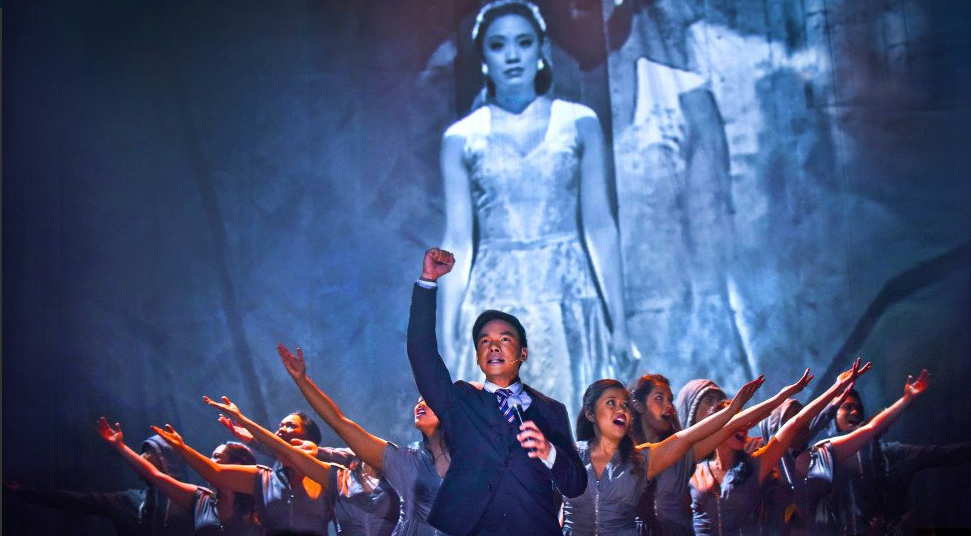By Andrew Hamlin
NORTHWEST ASIAN WEEKLY

“You won’t believe it,” said one of the lady ushers to an audience member, before the balcony opened up for seating. “They’ve redesigned it inside so it looks exactly like a nightclub.”
Indeed, the main floor for “Here Lies Love,” a rock opera, or as its creators refer to it, a “poperetta,” looked exactly like a hip, happening “Club Millennium” as the DJ in charge dubbed it, replete with flashing lights, blinking lights, huge video screens displaying video art from wireframe vector graphics to images of Imelda Marcos and her family. Ms. Marcos, the subject of the evening, sat on-screen in a posed portrait with her family, including her husband Ferdinand, ruler of the Philippines from 1965 to 1981.
Darkness lay over the dance floor itself (people like to dance in the dark), and most crucially, I couldn’t quite tell who was a professional and who was an audience member, for the early going. That was deliberate, because the show’s creators — lyricist/conceptualist David Byrne, Fatboy Slim, who co-wrote the music with Byrne, choreographer Annie-B Parson, and director Alex Timbers — wanted the people who paid to get in, to become a part of the show. (The folks on the main floor, at least. Paying customers on the balcony don’t get nearly as much of an immersive experience. Consider that when buying tickets.)
So, say, the lady who stood in a far corner and shuffled side-to-side, by herself, was probably an audience member, but I wasn’t sure. The “Club” floor filled up, folks chatting, leaning in to hear each other against the music, dancing, wandering. (But not sitting. Nobody sits on the main level for this show.)
And for a while after kickoff time, 7:30 p.m., not much else happened. I wondered if we were going to get a decidedly avant-garde presentation on Imelda Marcos, using only the video screens, which could have told the story by themselves. (You don’t get a program for this show until the end — another special rule). At about 7:45 p.m. though, the house lights went down and the DJ began working the crowd and explaining procedure for the evening. Soon after that, cast members hit the (constantly-moving) stage, and things went forward in a relatively, though never completely, conventional manner.
That manner took us through the story of Imelda Marcos, who, under the terms of the show at least, began life in poverty, had a best friend and sometime-maid named Estrella Cumpas, rose to fame as a beauty queen, briefly dated Ninoy Aquino, who went on to become a Philippines senator opposing the Marcos regime, married Marcos because he was going places fast, blew kisses at the people of her country while stashing away millions in offshore accounts, then left the islands, in shame, alongside her disgraced husband.
As is often the case with stage plays, reality tells a somewhat different tale. Imelda Marcos’ family wasn’t always poor. I could not find any evidence that Aquino and the future Philippines first lady ever dated, or that Estrella Cumpas (who hangs over Imelda like a guilty conscience) actually existed. The opening night crowd contained a fair number of Filipinos, and I wondered what they made of this license taken with history.
That being said, I felt that the show treated Filipino culture with respect, and Imelda Marcos with a surprising amount of respect. The narrative of the show reminded me quite a bit of the hit stage musical “Evita,” but with a willingness to understand its central character that “Evita” never showed. Imelda Marcos never shakes her compulsion to be loved, and she never shakes her love of money (though her famous shoe collection never makes the stage). She does have a backstory, and an interior life. And — shades of “Evita” herself, and/or Charles Foster Kane from “Citizen Kane” — she learns, harshly, that some things in life cannot be bought.
Jaygee Macapugay held my attention as Imelda, although she wavered a bit on high, held notes. I wondered if she was having trouble hearing herself through the wireless microphone that she wore, like every other cast member. As Marcos and Aquino, respectively, Mark Bautista and Conrad Ricamora both came off dashing, handsome, and dynamic, Bautista seasoning his songs with just the right dash of menace.
And David Byrne himself stood on the dance floor for the whole show. He rocked back and forth, stood with his hands behind his back, mouthed his own lyrics, came out to sing an encore of the theme song, but that was the only time he called attention to himself. His casual participation in his own show underscored the immersive and participatory elements to “Here Lies Love.” Of course, he also might have been checking to see that all the working parts, including the opening night’s audience, played their parts well.
“Here Lies Love” plays through May 28, at Seattle Repertory Theatre, 155 Mercer Street at Seattle Center. For prices, showtimes, and more information, including special rules to follow at this show, visit seattlerep.org/Plays/1617/HL/Synopsis.
Andrew can be reached at info@nwasianweekly.com.



